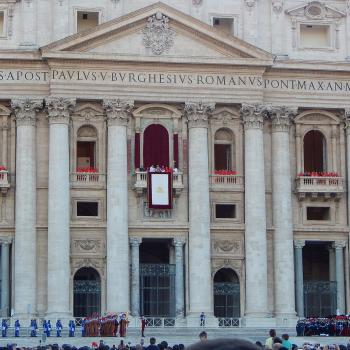Continuing with the discussion of Papal Economics, and no, you don’t have to read the book to follow along. Join us online-only, no problem. My first post in the series is here.
Today I’m responding to Theodore Seeber’s comments in his post “Private Property is under a Mortgage on the Poor”. Seeber writes:
I’m at a very curious point in my reading of Papal Economics. I’m in the middle of a chapter discussing Sollicitudo Rei Socialis, the social concern of the church, in which Pope John Paul II took the opportunity of the 20th anniversary of Pope Paul VI’s Populorum Progresso to strongly criticize the very form of central planning recommended in the previous document. The central planning of progressive socialists, it is argued, is inherently destructive of the natural subjectivity of the actors in the marketplace- by replacing organic consumer action with central planning based on objectivity instead.
–> Quick vocabularly note: When JPII and others write of people as “subjective” actors, it has a specific meaning. Think of the “subject of a sentence.” That is: The person initiating the action. The person doing something. NOT, “subject of authority,” a person being acted-upon or ruled over. Also not “subjective” in the sense of “subjective opinion,” as in, “I like cheese pizza but you like pepperoni,” contrasted with “objective” in the sense of “absolute truth”. If you are used to the other meanings of those words, slow yourself down and remind yourself subject of the sentence. Or something else that helps. In this context, Subject = good, Object = bad, because humans should be able to act freely (“subjects”) and not be used like some kind of thing (“objects”).
Now, continuing with my comments . . .
Here’s the thing about papal encyclicals, and it’s not tricky: Every encyclical comes in the context of a conversation. We have for a backstory the entire deposit of faith and history of Christian thinking. And then along comes something new. A new context. A new question being posed. In light of ___________, now what? What to do? How to respond?
This is why you really need to know the broad outline of economic and political history in order to understand the economic encyclicals. Without context, you have no idea what question is being answered. It’s a bit like seeing a conversation in which all you know is:
a) Mom said I could put on my jacket.
b) Mom said I should take off my shoes.
Does she want you to be warm? Cold? Is she contradicting herself? Or has the weather changed? I share something of Seeber’s frustration, because this is the point in the book where I realized that the only way to comment intelligently on any of this was to read all the encyclicals being discussed. I realized I couldn’t just work from my knowledge of the handful I’d read to date, and let the author feed thoughts to me.
Note: The papal encyclicals are enjoyable reading for the Christian economics junkie. They aren’t too hard for you, if this is your thing. But it takes time. I’ll get there. Plenty of fodder for years of blogging.
Seeber continues:
It is possible that Pope John Paul The Great’s experience with communism greatly influenced his love of the free market, but even he points out that the free market owes a great debt to those whose labor goes largely unrewarded.
And here is the crux of the problem: How to find that balance between freedom and responsibility? The Old Testament drips with this: Don’t withhold wages from the laborer. Don’t keep a man’s cloak for surety overnight, because it’s the only blanket he has. Take no interest on a loan: Don’t profit from another’s desperation. (More on usury another day. It’s a giant topic.)
Seeber finishes:
As Pope Francis put it a bit more forcefully recently in one of his homilies that went viral on the internet, anything extra that you would spend on luxury, rightly belongs to your starving brother.
And here we get, I think, to the tension between minimums and maximums. At a minimum, I need to not be a thief. Not profit at someone else’s expense. Most of Christian economic thinking — the doctrinally-binding stuff, anyhow — centers on a basic question: How do I avoid expressly harming another? But we don’t get to rest there. Imperfect charity is “first do no harm.” Perfect charity is self-giving love. Pouring yourself out for another, even for the undeserving. Christ begins His teaching with “Love your neighbor as yourself.” He ends with “Love one another as I have loved you.”
If I were to propose a possible way of reading the economic encyclicals, it would be to suggest that they are oriented primarily towards that first end: How do we, governments and societies, love our neighbor as ourselves? What actions, what laws, are suited to this? And then the halt John Paul II is calling in placing limits on central planning has to do with a recognition that the state cannot force us to love as Christ loves. It will fail. Sacrificial love must always be freely given.
***
Book Tip: Mark Shea’s new book Salt and Light: The Commandments, the Beatitudes, and a Joyful Life is on my wishlist. I’ll probably buy it and devour it here shortly. It tackles just this theme of the Christian “minimums” and “maximums” in moral behavior. Smart money says that this is the sort of book that will give you the moral framework necessary to understand the economic encyclicals. You still have to learn your history and econ theory, too. But for the moral dimension, give this one a stab.











